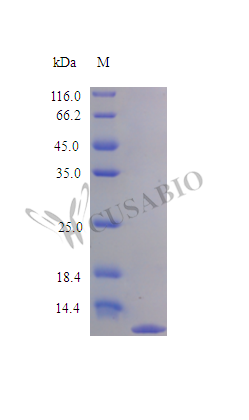This recombinant rat C-C motif chemokine 4 protein (Ccl4) is expressed in E. coli and spans the complete length of the mature protein, from amino acids 24 to 92. The protein comes without any tags and shows purity levels greater than 95%, as confirmed by SDS-PAGE analysis. Full biological activity has been validated through chemotaxis bioassays using human peripheral blood monocytes at concentrations ranging from 10-1000 ng/ml. Endotoxin levels remain below 1.0 EU/µg, as measured by the LAL method.
C-C motif chemokine 4 belongs to the chemokine family and appears to play an important role in immune system function. The protein is involved in recruiting and activating immune cells, particularly monocytes, and seems critical for inflammatory responses. Researchers studying immune cell signaling and inflammation mechanisms may find this protein valuable for gaining insights into various immunological and inflammatory processes.
Potential Applications
Note: The applications listed below are based on what we know about this protein's biological functions, published research, and experience from experts in the field. However, we haven't fully tested all of these applications ourselves yet. We'd recommend running some preliminary tests first to make sure they work for your specific research goals.
1. Monocyte Chemotaxis Assays
This recombinant rat CCL4 protein is confirmed to be biologically active in human monocyte chemotaxis (active at 10-1000 ng/ml) and suitable as a positive control. However, the wide activity concentration range suggests variable potency, requiring careful dose optimization for different monocyte sources. Researchers should validate its activity in rat-specific monocyte populations to confirm cross-species reactivity and establish species-specific dose-response relationships. The high purity (>95%) supports reliable results, but the broad activity range indicates that optimal concentrations may vary significantly between different experimental systems.
2. Receptor Binding and Interaction Studies
The biologically active CCL4 is appropriate for CCR5 binding studies, but the demonstrated activity in human cells and wide concentration range may not directly reflect rat-specific binding characteristics. Researchers should validate binding kinetics in both human and rat receptor systems to properly interpret species-specific differences. The tag-free design is advantageous, but the relatively high effective concentrations (up to 1000 ng/ml) suggest moderate binding affinity that may require sensitive detection methods.
3. Antibody Development and Validation
This high-purity CCL4 serves as a good immunogen for antibody development. However, antibodies should be validated against native rat CCL4 from inflammatory sources to ensure recognition of physiologically relevant forms, as the E. coli expression lacks mammalian post-translational modifications. The confirmed cross-species bioactivity indicates proper folding, but comprehensive validation should include both human and rat systems.
4. Protein-Protein Interaction Analysis
The protein can be used for interaction studies, but the partial sequence (24-92aa) may lack elements present in the full-length protein that affect some interactions. Studies focusing on core CCR5 interactions are supported, but interactions with glycosaminoglycans or other modulators may be affected by the truncated form. The wide activity range suggests that interaction studies should cover a broad concentration spectrum.
5. Biochemical and Structural Characterization Studies
This CCL4 is suitable for basic biochemical analyses, but the E. coli expression system produces a non-glycosylated protein that may exhibit different stability and structural properties compared to native CCL4. Techniques like circular dichroism can assess secondary structure, but results may not fully represent the native protein's behavior in physiological conditions. The broad activity range may reflect heterogeneity in protein folding that could affect structural studies.
Final Recommendation & Action Plan
This recombinant rat CCL4 protein demonstrates biological activity in human monocyte chemotaxis but with a relatively wide effective concentration range (10-1000 ng/ml), suggesting variable potency or the need for system-specific optimization. Researchers should first establish precise dose-response curves in their specific experimental systems, as the broad activity range indicates that optimal concentrations may vary significantly between different cell sources and assay formats. For studies involving rat models, validate activity in rat-specific monocyte populations to confirm cross-species reactivity. When developing antibodies, ensure comprehensive validation against native CCL4 from relevant inflammatory contexts. For binding and interaction studies, the tag-free design is advantageous, but researchers should account for the moderate potency suggested by the high effective concentrations. The high purity and low endotoxin support cell-based applications, but the wide activity range necessitates careful concentration optimization for each specific application. Always include appropriate controls and consider that different monocyte subsets and activation states may exhibit varying sensitivity to CCL4 stimulation.






